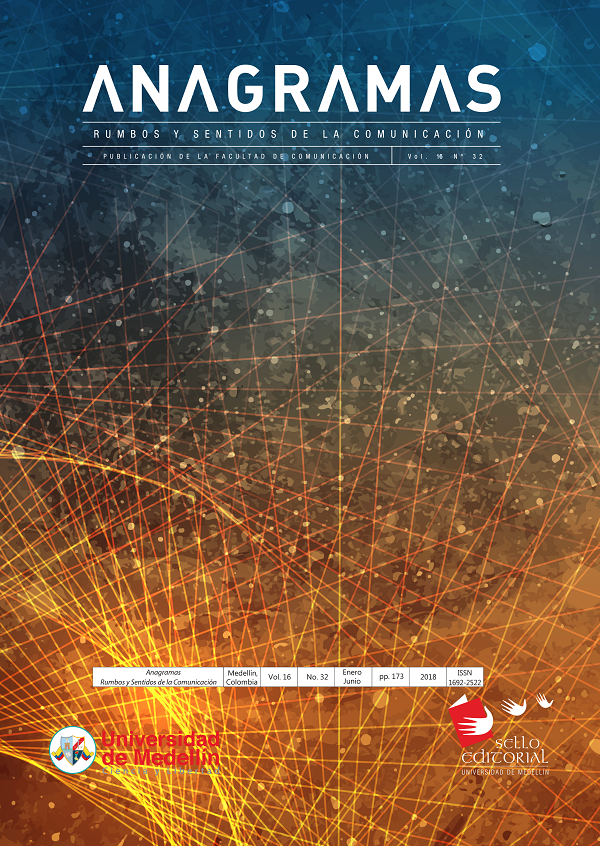Mistrust in the Neighbor: An Obstacle for the Communication Plans for Social Cohesion in Rural Sectors of Colombia
Main Article Content
Abstract
The development of public sector activities in Colombia, aimed at affecting the peasants' standard of living, is hampered by the lack of credibility of public entities and external staff. However, the lack of confidence in the neighbors' actions is specially surprising. Understanding the issue of distrust becomes a fundamental element in social cohesion processes in Colombia, given the current situation. This article analyzes the feeling of distrust among neighbors of a rural community in the irrigation district of Monquirá (Boyacá, Colombia), and intends to contribute elements for actions aimed at creating social cohesion programs, in scenarios in which the trust in neighborhood communities is sought. The investigation starts from the following question: what is the degree of trust in the members of the same community that assume leadership and representation roles in State entities? To find out, a non-probabilistic sample was carried out, in which an unstandardized instrument, based on the three levels of Kelman's social influence, was applied. The study allowed to understand the behavior of the users of the irrigation district. It was found that the individuals fear that the neighbors will not comply with their commitments, and a fragmentation of the social cohesion is evidenced due to the distrust in the actions of the other.
Article Details
References
Arriagada, I., Atria, R., Robison, L., Siles, M. y Whiteford, S. (2003). Capital social y reducción de la pobreza en América Latina y el Caribe: en busca de un nuevo paradigma. Santiago de Chile: Cepal Editores.
Berman, E. (1997). Dealing with cynical citizens. Public Administration Review, 57(2), 105-112.
Canel, M. J. (2007). La comunicación de las instituciones públicas. Madrid: Tecnos.
Canel, M. J. (2009). El impacto de los sucesos imprevistos en la imagen pública de los gobiernos españoles. Análisis, (38), 219-236.
Canel, M. J. y García, A. (2013). Comunicar gobiernos fiables. Análisis de la confianza como valor intangible del Gobierno de España. Revista ZER, 18(34), 29-48.
Couch, L. y Jones, W. (1997). Measuring Levels of Trust. Journal of Research in Personality, 31, 319-336.
Davis, F., Bagozzi, R. y Warshaw, P. (1989). User acceptance of computer technology: a comparison of two theoretical models. Management Science, 35, 982-1003.
Durlauf, S. y Fafchamps, M. (2004). Social capital Cambridge: National Bureau of Economic Research. En: Philippe Aghion y Steven Durlauf (ed.) Manual de crecimiento económico (pp. 1639-1699) Cambridge, Massachusets: Elsevier.
Durston, J. (2002). El capital social campesino en la gestión del desarrollo rural. Díadas, equipos, puentes y escaleras. Santiago de Chile, Chile: Publicación de las Naciones Unidas.
Durston, J. (2001). Parte del problema, parte de la solución: el capital social en la superación de la pobreza en América Latina y el Caribe. En Libros de la Cepal (Ed.), Capital social y reducción de la pobreza en América Latina y el Caribe: en busca de un nuevo paradigma (pp.147-202). Santiago de Chile, Chile: Publicación de las Naciones Unidas.
Fernández, J., Pinzón, C. y Moreno, J. (2014). Capital social en áreas rurales: adaptación al español y validación factorial de una escala. Ciencia y Salud Colectiva, 19(7), 2207-2214.
Flora, J. y Butler, C. (2003). Desarrollo comunitario en las zonas rurales de los Andes. En I. Arriagada, R. Atria,L. Robison, M. Siles y S. Whiteford (Eds.), Capital social y reducción de la pobreza en América Latina y el Caribe: en busca de un nuevo paradigma (pp. 555-578). Santiago de Chile: Cepal Editores.
Grunig, J. E., y Hon, L. (1999). Guidelines for measuring relationships in Public Relations. Florida, Estados Unidos: The Institute for Public Relations.
Islam, M. K., Merlo, J., Kawachi, I., Lindstrom, M. y Gerdtham, U. G. (2006). Social capital and health: does egalitarianism matter? A literature review. International Journal for Equity in Health. Recuperado de https://equityhealthj.biomedcentral.com/articles/10.1186/1475-9276-5-3
Sloep, P. y Berlanga, A. (2011). Redes de aprendizaje, aprendizaje en red. Comunicar, 19 (37), 55-64.
Wang, H., Schlesinger, M. y Hsiao, W. C. (2009). The flip-side of social capital: the distinctive influences of trust and mistrust on health in rural China. Social Sciences and Medicine, 68(1), 133-142.





